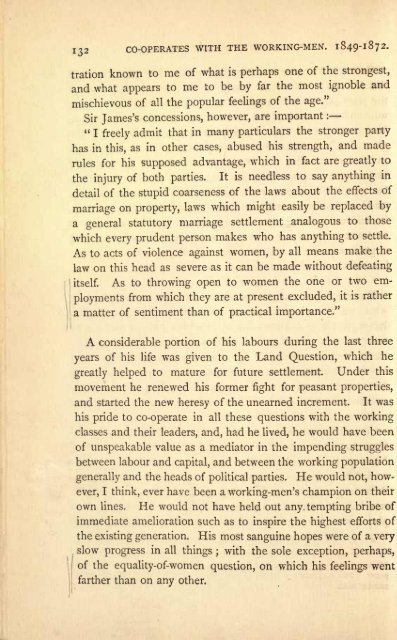John Stuart Mill: A Criticism with Personal Recollections
John Stuart Mill: A Criticism with Personal Recollections
John Stuart Mill: A Criticism with Personal Recollections
You also want an ePaper? Increase the reach of your titles
YUMPU automatically turns print PDFs into web optimized ePapers that Google loves.
132 CO-OPERATES WITH THE WORKING-MEN. 1849-1872.<br />
tration known to me of what is perhaps one of the strongest,<br />
and what appears to me to be by far the most ignoble and<br />
mischievous of all the popular feelings of the age."<br />
Sir James s concessions, however, are important :<br />
"<br />
I freely admit that in many particulars the stronger party<br />
has in this, as in other cases, abused his strength, and made<br />
rules for his supposed advantage, which in fact are greatly to<br />
the injury of both parties.<br />
It is needless to say anything in<br />
detail of the stupid coarseness of the laws about the effects of<br />
marriage on property, laws which might easily be replaced by<br />
a general statutory marriage settlement analogous to those<br />
which every prudent person makes who has anything to settle.<br />
As to acts of violence against women, by all means make the<br />
law on this head as severe as it can be made <strong>with</strong>out defeating<br />
itself. As to throwing open to women the one or two em<br />
it is rather<br />
ployments from which they are at present excluded,<br />
a matter of sentiment than of practical importance."<br />
A considerable portion of his labours during the last three<br />
years of his life was given to the Land Question,<br />
which he<br />
greatly helped to mature for future settlement. Under this<br />
movement he renewed his former fight for peasant properties,<br />
and started the new heresy of the unearned increment. It was<br />
his pride to co-operate in all these questions <strong>with</strong> the working<br />
classes and their leaders, and, had he lived, he would have been<br />
of unspeakable value as a mediator in the impending struggles<br />
between labour and capital, and between the working population<br />
generally and the heads of political parties. He would not, how<br />
ever, I think, ever have been a working-men s champion on their<br />
own lines. He would not have held out any. tempting bribe of<br />
immediate amelioration such as to inspire the highest efforts of<br />
the existing generation. His most sanguine hopes were of a very<br />
slow progress in all things ; <strong>with</strong> the sole exception, perhaps,<br />
I of the equality-of-women question, on which his feelings went<br />
farther than on any other.

















